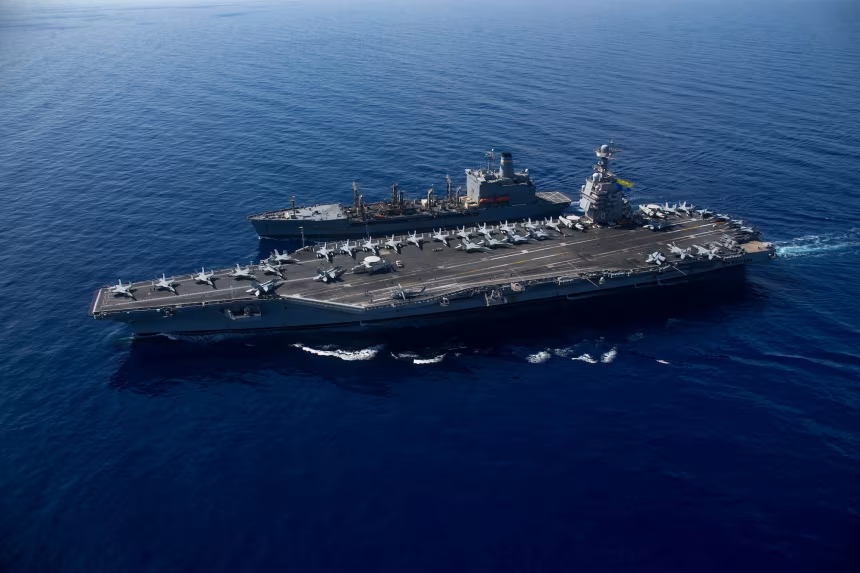President Donald Trump is reportedly considering an unprecedented move — targeting cocaine facilities and drug trafficking routes inside Venezuela — as part of a broader effort to curb narcotics entering the United States. According to three U.S. officials familiar with the matter, the president has yet to make a final decision, but discussions inside the administration suggest serious consideration of military options alongside diplomatic ones.
Signs of a potential escalation emerged Friday when Defense Secretary Pete Hegseth ordered the Navy’s most advanced carrier strike group — the USS Gerald R. Ford — to reposition from Europe toward the Caribbean. The redeployment, coupled with the authorization of covert CIA operations in Venezuela, underscores Washington’s growing focus on the region.
While Trump has not ruled out diplomacy, U.S. officials say the administration’s tone has hardened in recent weeks. Active talks with Venezuelan President Nicolás Maduro were halted earlier this month, though the White House insists it remains open to dialogue if it leads to measurable action against drug trafficking.
Venezuela, according to the United Nations Office on Drugs and Crime (UNODC), is not a major cocaine-producing nation. Coca cultivation remains concentrated in Colombia, Peru, and Bolivia. Even the U.S. Drug Enforcement Administration’s (DEA) latest report did not list Venezuela among the key producers or exporters. Still, senior Trump administration figures continue to link Maduro to the international drug trade, citing ongoing trafficking through Venezuelan territory and past U.S. indictments against the embattled leader.
“Nicolás Maduro is an indicted drug trafficker and a fugitive of American justice,” Secretary of State Marco Rubio said during a recent visit to Ecuador, echoing the administration’s narrative that the Venezuelan regime profits from cartel activities.
A Strategy Beyond Drugs
Beyond drug interdiction, some insiders acknowledge that these operations may also serve a political purpose — regime change. Sources close to the discussions say certain officials view a targeted anti-drug campaign as a pathway to destabilize Maduro’s inner circle. By pressuring figures tied to illicit profits, Washington hopes to encourage defections or internal moves that could lead to Maduro’s removal.
Trump himself has publicly hinted at the possibility of “operations on land,” but has avoided specifying their scale or intent. In an interview Thursday, he emphasized that he does not need Congress’s approval to strike traffickers abroad. “I’m not going to necessarily ask for a declaration of war,” he said. “We’re just going to kill people that are bringing drugs into our country.”
The president’s remarks have reignited debate in Washington over executive war powers. While some legal experts argue that anti-drug operations abroad can proceed under existing authorities, others caution that attacks on sovereign territory could require congressional authorization or at least formal briefings.
Military Buildup in the Caribbean
The Pentagon’s growing presence in the Caribbean is hard to ignore. The redeployment of the Gerald R. Ford strike group — consisting of an aircraft carrier, guided-missile destroyers, and a cruiser — is just one part of a much larger repositioning. The Iwo Jima Amphibious Ready Group, along with the 22nd Marine Expeditionary Unit, has already been stationed in the area. Combined, they bring more than 4,500 Marines and sailors to U.S. Southern Command’s jurisdiction.
In addition to naval assets, the U.S. has deployed 10 F-35 fighter jets and several MQ-9 Reaper drones to Puerto Rico, now serving as a strategic hub for surveillance and rapid-response operations. Satellite imagery also shows that Naval Station Roosevelt Roads — shuttered since 2004 — has been reactivated to support these missions.
Pentagon Press Secretary Sean Parnell framed the buildup as a necessary step to “dismantle Transnational Criminal Organizations and counter narco-terrorism.” However, the scale and speed of U.S. mobilization have prompted speculation that Washington’s objectives may extend beyond drug enforcement.
Balancing Diplomacy and Force
Despite the show of force, senior officials describe the president’s approach as cautious. “There are plans on the table,” one administration official told CNN, “but the president hasn’t ruled out diplomacy.” Trump’s attention, they note, remains divided between his upcoming Asia trip and negotiations with Russia and Ukraine to end their war.
For now, Venezuela finds itself once again at the center of U.S. foreign policy friction. If Washington moves forward militarily, it risks not only worsening relations with Latin American neighbors but also drawing criticism from international institutions that already view sanctions and covert actions against Caracas as excessive.
Still, Trump’s political base may see decisive action as strength. The administration has repeatedly portrayed its anti-drug campaign as a matter of national security and moral duty — a fight against what Trump calls “poison pouring into our communities.”
As the U.S. Navy continues its operations against suspected narcotics vessels — with 10 boats destroyed and 43 traffickers killed since last month — the administration appears determined to keep military pressure high. Whether that pressure crosses into Venezuelan territory remains the critical question in the days ahead.

